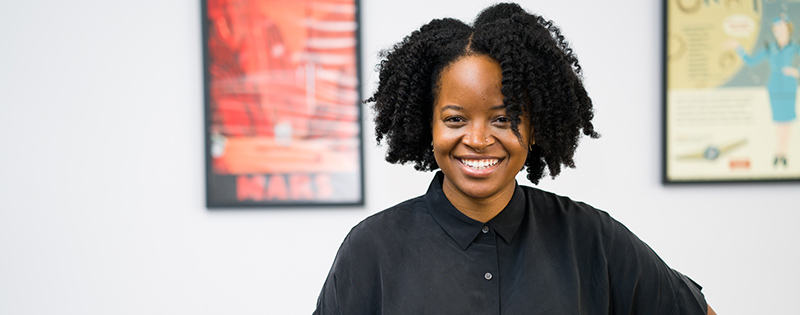5 questions with new AFAM Studies professor, Alyssa Collins
|
1. Tell us a little about your professional background. I grew up in the Midwest, in a small suburb of St. Louis called Edwardsville, Illinois. I studied English at Emory University, in Atlanta, GA, for my BA and I recently received my PhD from the University of Virginia. Between my graduate and undergraduate degrees, I worked in the publishing industry in New York City. I like to mention the gap between my degrees because working on the industry side changed the way I approached books, and their creation, and, also solidified my interest in studying literature. My years in the publishing industry also reignited a long love of science fiction and fantasy, two genres that I like to write about now! 2. What is the focus of your research and teaching? I research the intersections of blackness, embodiment, and technology. This leads
me to read and write about Afrofuturist texts and to think about robots, AI, and androids,
a lot. The questions at the heart of my work are: what could social media, robotics,
or the future look like if the default human wasn’t always a white guy? And, how are
black people using contemporary technologies in their own revolutionary ways? 3. Where can we find your writing and research online? During graduate school, I published several times in the online academic publication Black Perspectives, the blog of the African American Intellectual History Society. I wrote articles about black women in contemporary comic books, collective digital practices of black communities on Twitter, as well as an interview with a biographer of Pauli Murray. I also worked on the editorial team as an intern. Black Perspectives was one of the earliest places where I read and felt academic community outside of my institution. Their commitment to fostering public scholarship and accessibility is incredibly cool. Check them out if you can! 4. What are you teaching at USC this semester? What class are you looking forward to offering in the future? This semester I’m teaching surveys in both African American literature after 1903, and American literature. In the future, I’ll be very excited to teach more literature, media, and theory classes about contemporary Afrofuturism and the black women and nonbinary writers of the science fiction. 5. What has excited (or puzzled) you the most about Columbia so far? What’s up with the golf carts? Are they street legal in South Carolina? I see them on the road everywhere and I do not understand! |
